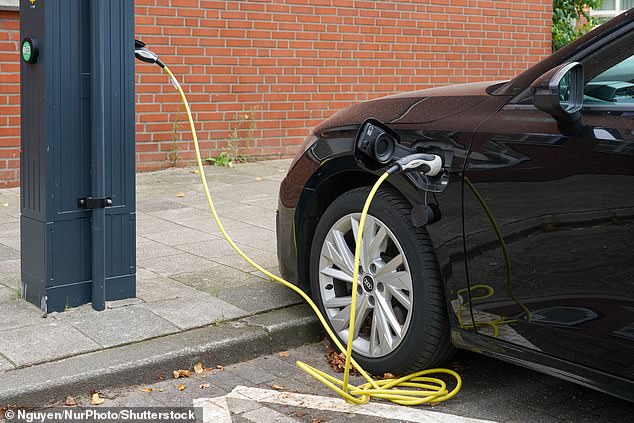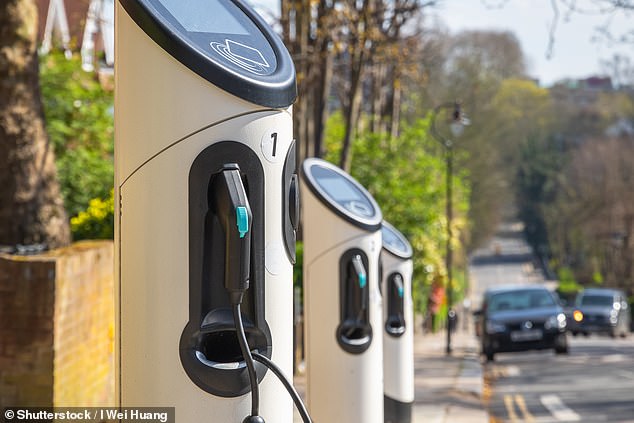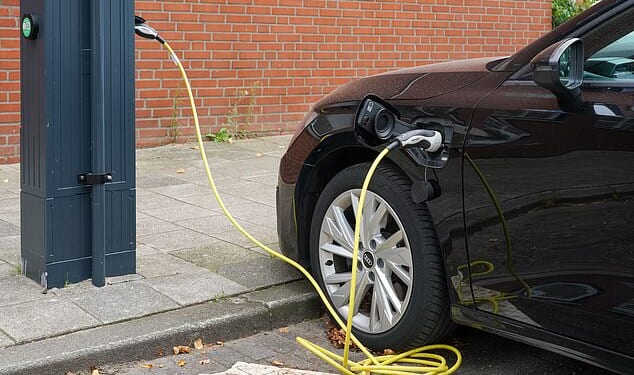Drivers are being put off the idea of owning an electric car because of ‘myths’ about range anxiety, high vehicle prices and steep charging costs, according to a new report.
Chargepoint supplier Char.gy, which commissioned a survey of 1,005 UK drivers and 206 EV owners, claims electric cars are ‘rapidly outpacing’ petrol and diesel models on performance and value but demand is being strangled by misconceptions held by the general public.
The poll found that 71 per cent of respondents who do not drive an EV said their biggest concern about them was range anxiety, which is the fear that an EV could run out of charge mid-journey.
This is despite ‘significant improvements’ in EV range since the first models were brought to market, according to char.gy.
According to public charging network Gridserve and EV salary sacrifice supplier the Electric Car Scheme, the average range for a new battery vehicle sold in the UK in 2025 is approaching 300 miles.
With cars in the UK driven – on average – 19 miles per day, this means EV owners would, in theory, need to charge up just once a fortnight.
John Lewis, chief executive at the EV charging supplied, says EVs ‘aren’t a distant future anymore’ but sales are being stifled by ‘the stories we tell about them’.

‘Myths’ about the performance and value of electric cars is stifling the EV revolution, according to a new report
The survey found that another major common reason for unease about EVs is purchase price (62 per cent), which is typically at a premium of between £5,000 and £10,000 over a petrol-engined equivalent.
That said, Labour’s introduction of the Electric Car Grant (ECG) scheme is aiming to nullify the higher pricing with discounts of between £1,500 to £3,750 for the most affordable EV models with an RRP of up to £37,000.
Some 35 electric models are already eligible for these discounts – though just two have met the Government’s stringent ‘sustainability criteria’ to be awarded the full £3,750 subsidy.
More EVs are due to qualify for the grant, while makers of models that do not meet the green criteria – namely those produced by Chinese and East Asian brands – have launched their own manufacturer-backed discounts to keep their cars competitive.
Char.gy also pointed to the average cost of used EVs dropping by more than a fifth since 2023, which has been a direct result of ongoing reluctance among the mainstream to switch to battery cars.
It says prices are expected to fall another 28 per cent by 2030 as more electric models enter the market and concerns about battery longevity remain.
Elsewhere, almost two thirds (63 per cent) of non-EV owners said cheaper charging would persuade them to switch.
However, the issue of how people can charge an EV depending on where they live is set to remain.
Almost three quarters of drivers (72 per cent) of motorists who are not considering buying an EV at all said one of the primary reasons was because they cannot charge one at home.
Approximately 65 per cent of UK households (or 18 million out of 27.6 million households) have enough off-street parking for at least one vehicle, according to 2021 data from the RAC Foundation.
The third of people without this facility – namely those living in major cities, flats and terraced housing – are therefore reliant on public and residential charging facilities, which not only remain relatively sparse but can be as much as three times as expensive as using a domestic EV tariff.
Latest published industry figures show that 10,519 public chargers were installed in the UK in the first seven months of the year – or just under 50 a day.
This is below the 54 put in place on average per day last year, which has further fuelled fears that the EV revolution targeted by ministers in a push to Net Zero has stalled.
Lewis remained resolute, however, stating: ‘If we can debunk the myths and meet people where they are, especially at the kerbside, we’ll accelerate this transition [to EVs] faster and fairer.’
Sue Davies, head of consumer protection policy at watchdog Which?, responded to Char’gy’s report stating that while EVs ‘generally perform well’ in its tests and are popular with existing owners, the ;high upfront cost and poor confidence in public charging; remain ;major barriers;.
She addedd: ”Those in remote areas are also worried about range, reliability and breakdown support.
‘If the government wants to meet its 2030 ambitions, it must improve the availability and experience of public charging to give drivers the confidence to switch.’

The UK’s public charging network is growing but – based on latest installation figures – at a slower rate than what ministers have targeted to meet Net Zero ambitions
Ginny Buckley, broadcaster and founder of EV advice website Electrifying.com, said Char.gy’s report ‘clearly shows’ that barriers to electric car adoption ‘are not just technical; they’re psychological, practical and deeply human’.
Buckley added: ‘Misconceptions persist, access remains unequal, and for too many drivers the EV future still feels out of reach.’
Tanya Sinclair, chief executive of lobby group Electric Vehicles UK, said correcting ‘common EV myths’ would boost willingness to consider an electric car by 12 per cent.
‘Everyone in e-mobility has heard the myths.
‘We tend to dismiss them as noise, but repeated often enough, they shape real decisions.’
Some 276,635 EVs have been registered in the UK in 2025 up to the end of August – a year-on-year increase of 29.5 per cent, official sales figures published by the Society of Motor Manufacturers and Traders shows.
EVs now represent more than one in five (21.9 per cent) car sales in Britain, up from 18.3 per cent in 2024 – though just one in ten private buyers opted for an electric vehicle in the previous calendar year, with fleets and businesses driving the majority of demand.













